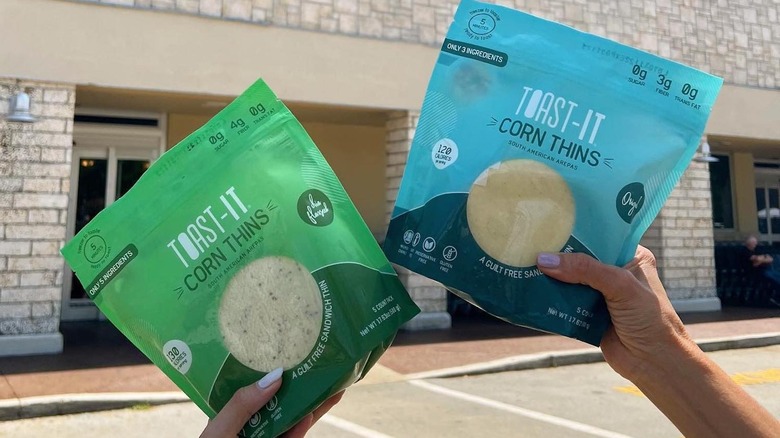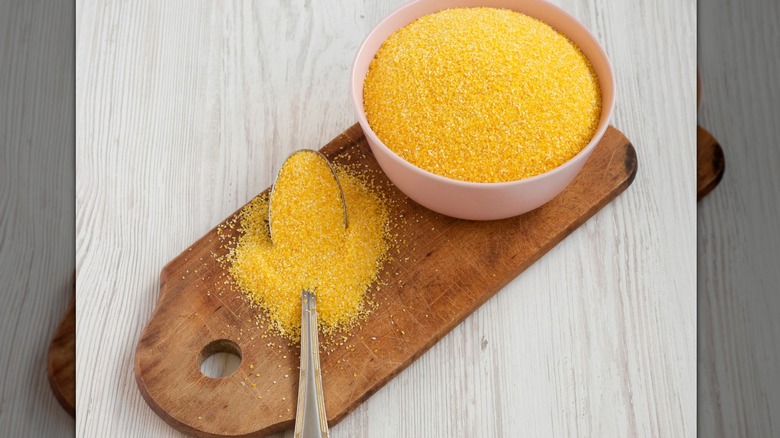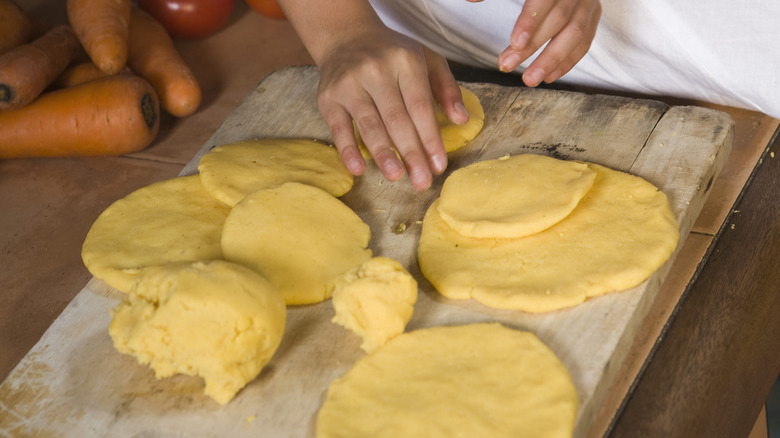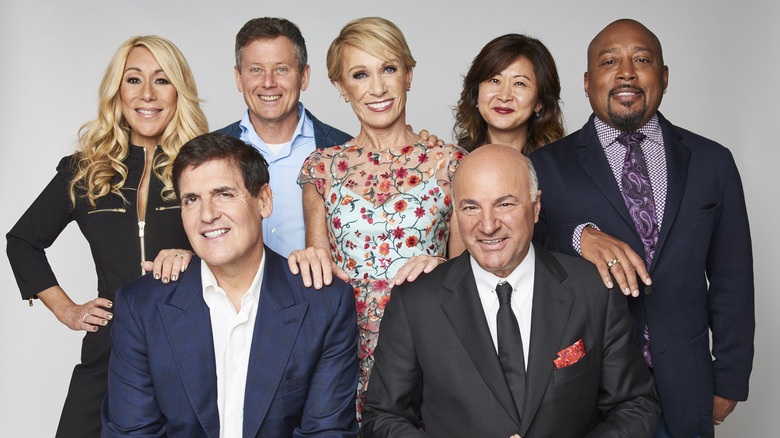What You Need To Know About Toast-It From 'Shark Tank'
The second season of the ABC primetime show, "Shark Tank," is just getting started — and it's already introducing fans to some unique food and beverage brands. The first episode, which premiered on September 29th, brought on the best-friend duo behind Pie Wine, a wine made specifically for pairing with pizza. It was quite a concept, but the sharks weren't biting. Perhaps the next episode's lineup will be hungrier, and if it's Latin food they're craving, they'll be in for a treat. That's because sisters and co-founders Mafe Cabezas and Coco Viete are pitching them their line-up of ready-to-toast arepas, pandebonos, and buñuelos.
Fittingly named "Toast-It," these sisters built a brand out of the one thing they missed the most after moving to the U.S. from Caracas, Venezuela — their mother's cooking. With these sisters' pride in their culture at its core, Toast-It's mission is to bring Latin American food staples to the U.S. market. To do that, they made them toastable, but what's really impressive is that they did so without compromising any of the traditional flavors or ingredients of their home country. It's got all the fixings for a deal — but will it be enough to convince the panel of hard-ball entrepreneurs? For that, you'll have to wait to find out; in the meantime, find out what makes Toast-It tick or, in this case, toast.
From an abuela to your toaster
When Mafe and Coco say that Toast-It was born from their longing for their mother's cooking, they aren't lying. The recipes for their products were crafted from the secrets passed down to them from their grandmother's cookbook. So while their toaster-ready product may save you all the time they'd take crafting from scratch, they don't lack any of the authentic flavor of Central American ingredients.
Nor do they lack any of the love that would come if they were made by your mom. The sisters will tell you that they infused a bit of "cariño" into them — or the Spanish word for affection, which, in this case, could also be translated into pure dedication. Mafe and Coco built Toast-It from their own kitchens, personally cooking and delivering each order until the day came when they finally saw their products hit store shelves. For them, making it onto "Shark Tank" is a dream come true.
Authentic ingredients
Of course, by sticking to the recipes passed down from their grandmother to their mom and now to them, Mafe and Coco's products are made using ingredients that are true to their Venezuelan culture. The Toast-It arepas, for instance, are made using white cornmeal flour, much like the masarepa that's used in traditional arepas. But, they also come in other versions — one that's seeded, combing the cornmeal with flax and chia seeds, and another made with cassava, also known as yuca flour, that is also traditional to Latin cuisines.
But Toast-It is about much more than just arepas. They're also toasting up other Latin food staples — including pandebono and buñelos. The pandebono bites, which are also made from cassava flour, are filled with Latin American white cheese. The buñuelos, on the other hand, feature the same soft cheese, but they combine it with the rich flavor of baked plantains. In all of their authenticity, however, Toast-It's finished, frozen products are made to toast — just throw them in your air fryer or toaster oven, and they're ready in 10 minutes.
Whole Foods, Walmart, and more
Sometimes, the food products and kitchen gadgets featured on "Shark Tank" aren't yet available for purchase, but in the case of Toast-It's, they are. If a toaster-ready arepa sounds like something up your alley, or those buñuelos are calling your name, you can get your hands on them. The Toast-It website sells them directly and even offers a subscription service, so you never run low on them. For around $50, you get a six-pack of their arepas, coming out to 30 total.
If you know you already like them, go nuts, but that's a lot of arepas to commit to if you haven't tried them first. Fortunately, you can also find Toast-It's products at certain grocery stores. Being based in Miami, Toast-It's toastable arepas are available for in-store purchase at Walmart, Winn Dixie, Publix, and, most recently, Whole Foods locations all over Florida. They're also stocked in stores in Austin, Texas, New Orleans, Louisiana, and other cities across the south. Hopefully, should they wow the sharks and get a business boost, they'll be popping up in stores in all areas after the second episode airs on October 6th.
What happened to Toast-It on Shark Tank
Mafe and Coco put up a solid presentation for this episode's sharks. Their points highlighted their inspiration for creating Toast-It in the first place, drawing on their experience moving from Venezuela to the U.S. They also made points about the convenience of their products, the ingredients they use, and their health benefits, noting the absence of trans-fats and the fact that they're gluten-free. In the end, the sisters' pitch was rounded out by one hard fact: that the Hispanic community is the fastest-growing minority in the U.S., and the love for Hispanic food is mainstream across the country.
Chefs then got to dig into Toast-It's arepas filled with queso blanco and plantain, the chia-flax seed arepas with guacamole, and the cassava arepas stuffed with mozzarella cheese. But, rather than sitting and eating, the sharks wanted to talk numbers. The sisters gave an overview of that brand's current distribution stores, competitors, and revenue margins — which is where these sharks' ears perked up, O'Leary's especially. Despite being concerned about the founder's thin margins, O'Leary, who doesn't consume gluten, believed the product was a solution for him and others like him.
O'Leary made the sisters an offer: $100 grand for 20% equity — a steep cut for Mafe and Coco, who were asking for the same amount of money for 5%. Guest shark Daniel Lubetsky matched it, and the girls countered by offering them both 15% equity for $150,000, ultimately striking a deal with Lubetsky.




